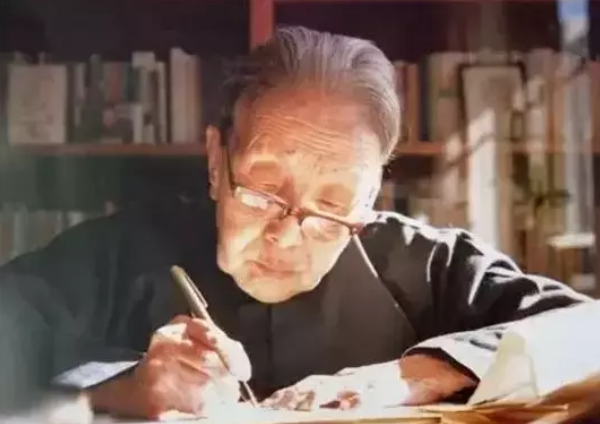BING Xin, formerly known as XIE Wanying, was born in 1900 in Fuzhou, Fujian, a port of commerce, into a family of officers. She received a good family upbringing and education and entered the church-run School of the Bedouin Women. After graduating as the head of her class, she entered Xiehe Women's University Foundation Science Programme and later transferred to the Department of Literature.
Although Bing had lived in the trade port since childhood, some people in her extended family believed in Christianity, and later went to a church-run school, her attitude to Christianity was different from that of traditional Christians in that she did not pay attention to rituals. In regards to worship and baptism she had always held an indifferent attitude. "I was very casual. When I was baptized in Yanjing, it was not in a large church but in the house of an old pastor. At that time my husband said that many classmates were watching me. If I had not been baptized, they would also not be. I said it was easy, then I was. I do not value much religious rituals but only am convinced of behaving as a person who does not violate the creed." This may be the reason why the traditional Christian community in China does not consider her a Christian as she is relatively unfamiliar to them.
Although Bing had an indifferent attitude towards rituals, she highly acknowledged Christian brotherly love and sacrifice as the spiritual core of the faith. In her works and later life she dedicated herself to such practices. This had been very closely related to her family's ethos and the influence of liberal Christian, John Leighton Stuart.
With regards to religious attitude, she did not hold strongly to traditional Christianity, but maintained a kind of tolerance and respect. In her speech "How to Appreciate Chinese Literature", delivered in Japan in 1949, she put forward her religious attitude at the outset: "The Chinese are non-religious people. Non-religion is not against religion. China has no State religion and does not set up a religion such as Shinto... The 'heaven' Confucius mentioned was not the so-called heaven of other religions. Confucius said, "How do I know death without knowing life?' So Confucianism is not a religion. A religion would have had two conditions, one for idol worship and the other for believing in the afterlife. None of the two conditions exist in Confucianism. Chinese religion is foreign was later introduced to China... Family members may believe in different religions. There would be no conflict with each other nor would there be too serious problems, a phenomenon that would never exist in the West. Scholars... out of frustration or desperation turn to religion for self-relief rather than actively believing ... The Chinese are non-religious, and this is something that people who have been to China can feel." In the mind of Bing, love is at the core and exclusive religion has only abandoned love. This is similar to Mother Teresa's thought.
Bing was not a blindly religious believer, but a Christian with independent thinking. Although her education was at schools run by white American Christian churches, when she went to study in the United States and saw that black people in the southern States could not worship with whites, her heart was filled with doubts and grievances because she saw this as incompatible with the fraternity and equality of the teachings of Jesus that she accepted. She could not help but speak out against the discriminatory policy of racial segregation. In her article Mourning Dr. Dubois, she wrote, "if apartheid is practised in God's church, is it still a religion that promotes freedom, equality and fraternity?"
In her novel Photo, Bing criticized more publicly the American church's differential treatment of Chinese believers. Through the novel's protagonist Li Tianxi, Bing said, 'Really, there are times when the church meets to have a sendoff for missionaries to China. Those who are leaving to go rise to speak and are sad and excited at the same time. Those who are sending express a great deal of admiration and yet pity at the same time. Those who are going are exiled. Ministry overseas involved sacrifice, I admit, but foreigners in China are much more comfortable than the Chinese in foreign countries at least from a material aspect, don't you think so?'
Bing was not only an independent Christian, but also a nature-loving naturalist who praised God from nature. In her article "Another Newsletter 25 to Young Readers", she wrote, "The religious thought in my life is completely derived from the beauty of nature. Not only the scenery but beautiful people are no exception! Seeing the beauty in flesh and blood form often makes me awe the admiration of creation."
In addition to the feelings of nature, Bing also implored God to guide people to establish a complete personality. The idea of a full personality, during Bing's time, was not a new concept. The revolutionary, Chen Duxiu, also appreciated and advocated the perfect personality of Jesus. Also at the time, the movement "Christian Salvation for China", advocated the perfect personality of Jesus. This complete personality, in Bing's mind, was 'the personality of love."
In reality, the personality of love was reflected in her actions. After the victory of the anti-Japanese war, Bing always mentioned human love to her Japanese friends in speeches and articles referring to the fraternity of Jesus. This however did not mean that there was no principled love. Rather, it was about "using the heart of Christ to imitate his great personality". "After gaining freedom and discerning the truth, we should 'return evil by virtue' 'embarking on the path of peacebuilding", so that 'the great love of the personality", "The Great Power of Love fills the World." (Quoted from "To the Women of Japan", "From the Old and Fractured Letter --- from the University of Tokyo podium", and "From Last Year's to This Year's Christmas").
- Translated by Charlie Li












